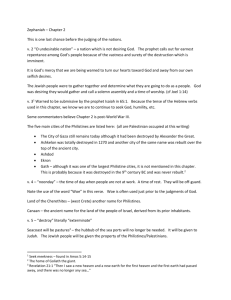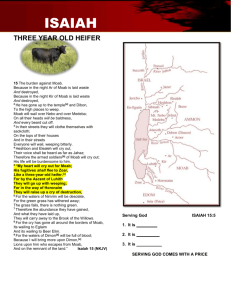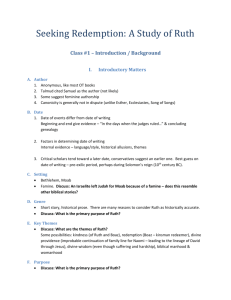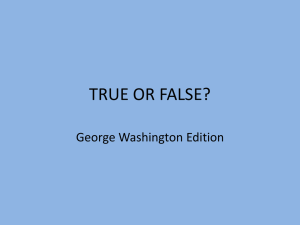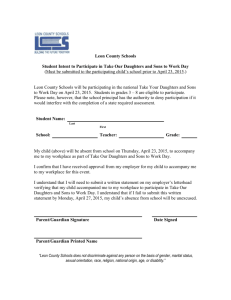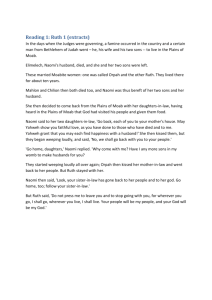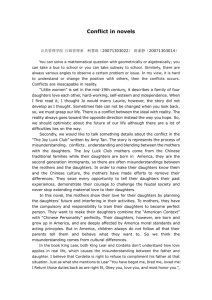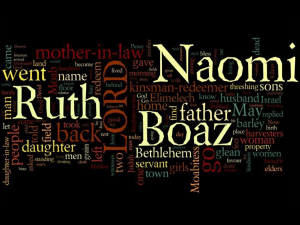Ammon, Moab, and Ruth the Moabite
advertisement
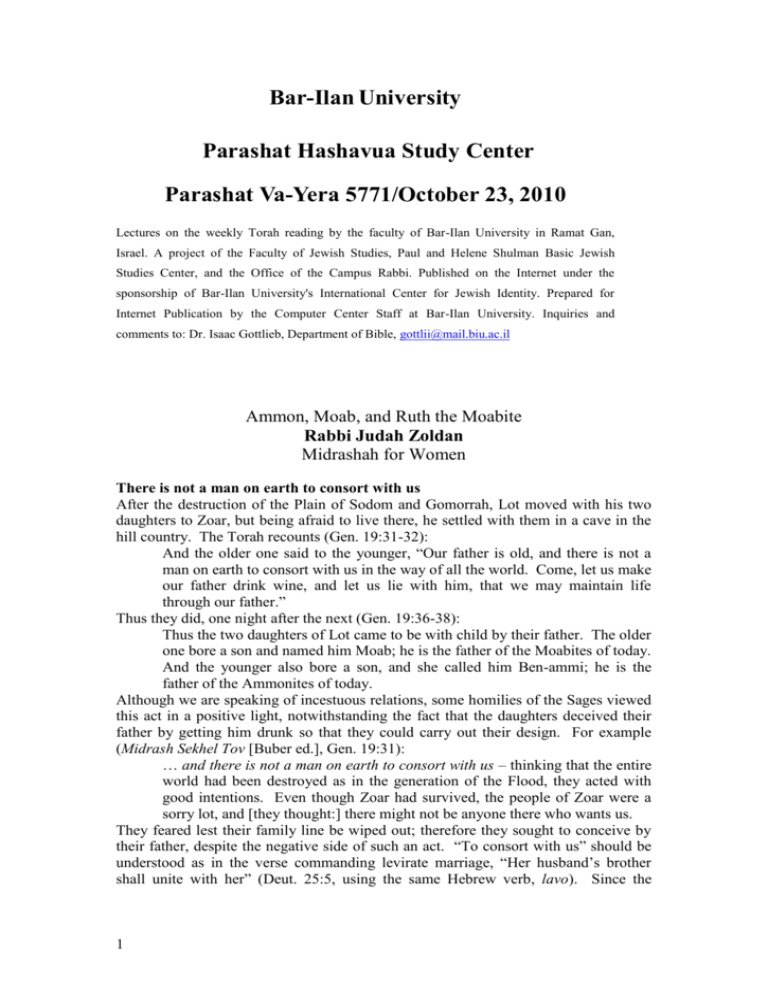
Bar-Ilan University Parashat Hashavua Study Center Parashat Va-Yera 5771/October 23, 2010 Lectures on the weekly Torah reading by the faculty of Bar-Ilan University in Ramat Gan, Israel. A project of the Faculty of Jewish Studies, Paul and Helene Shulman Basic Jewish Studies Center, and the Office of the Campus Rabbi. Published on the Internet under the sponsorship of Bar-Ilan University's International Center for Jewish Identity. Prepared for Internet Publication by the Computer Center Staff at Bar-Ilan University. Inquiries and comments to: Dr. Isaac Gottlieb, Department of Bible, gottlii@mail.biu.ac.il Ammon, Moab, and Ruth the Moabite Rabbi Judah Zoldan Midrashah for Women There is not a man on earth to consort with us After the destruction of the Plain of Sodom and Gomorrah, Lot moved with his two daughters to Zoar, but being afraid to live there, he settled with them in a cave in the hill country. The Torah recounts (Gen. 19:31-32): And the older one said to the younger, “Our father is old, and there is not a man on earth to consort with us in the way of all the world. Come, let us make our father drink wine, and let us lie with him, that we may maintain life through our father.” Thus they did, one night after the next (Gen. 19:36-38): Thus the two daughters of Lot came to be with child by their father. The older one bore a son and named him Moab; he is the father of the Moabites of today. And the younger also bore a son, and she called him Ben-ammi; he is the father of the Ammonites of today. Although we are speaking of incestuous relations, some homilies of the Sages viewed this act in a positive light, notwithstanding the fact that the daughters deceived their father by getting him drunk so that they could carry out their design. For example (Midrash Sekhel Tov [Buber ed.], Gen. 19:31): … and there is not a man on earth to consort with us – thinking that the entire world had been destroyed as in the generation of the Flood, they acted with good intentions. Even though Zoar had survived, the people of Zoar were a sorry lot, and [they thought:] there might not be anyone there who wants us. They feared lest their family line be wiped out; therefore they sought to conceive by their father, despite the negative side of such an act. “To consort with us” should be understood as in the verse commanding levirate marriage, “Her husband’s brother shall unite with her” (Deut. 25:5, using the same Hebrew verb, lavo). Since the 1 purpose of levirate marriage is to continue a family line that was cut off, the Midrash compares the motive of Lot’s daughters, who wished to continue the family line.1 Another homily indicates that not only the daughters but Lot as well was concerned that only he and his two daughters had survived after Sodom and Gomorrah were overturned. He, however, had other intentions (Tractate Nazir23a): Rabbah b. Bar Hana, quoting R. Johanan, said: The verse, “For the ways of the Lord are right, and the just do walk in them, but transgressors do stumble therein” (Hosea 14:10) may be … illustrated by Lot when his two daughters were with him. To these [the daughters], whose intention it was to do right, [applies] “the just do walk in them,” whereas to him [Lot] whose intention it was to commit the transgression [applies], “but transgressors do stumble therein.” The argument that Lot intended to commit a sin is based on the interpretation of his earlier wavering whether or not to join the people of Sodom. The Hebrew expression, “Lot looked about him” resembles the expression used in Genesis 39:7, “his master’s wife cast her eyes [upon Joseph],” which means that she lusted after Joseph. The fact that Lot was raped on the first night does not justify his act on the second night. He should have been more careful and not gotten drunk again. The conversation between Lot's daughters and the names they themselves gave their children have also been dealt with in homilies of the Sages (Nazir 23b-24a, Freeman ed., http://www.come-and-hear.com/nazir/nazir_23.html): R. Hiyya b. Abba, citing R. Johanan, said: How do we know that the Holy One, blessed be He, does not withhold the reward even for a decorous expression? The elder daughter [of Lot] called her son Moab [Heb. me-av = from father] and so the All-Merciful One said: Be not at enmity with Moab, neither contend with them in battle (Deut.2:9). Only war was forbidden, but they might be harassed. The younger daughter, on the other hand, called [her son’s name Ben-ammi [=son of my people] and so it says, Harass them not, nor contend with them (ibid.19). They were not to be harassed at all. A remarkable story is told in the introduction to Rabbi Moshe Feinstein’s Responsa Iggerot Moshe, Part 8, Jerusalem 1996, p. 15: A man was taken ill with a strange disease, causing his tongue to swell up. Rabbi Moshe Feinstein came to visit him, and the sick person requested that everyone else leave, then proceeded to tell the reason for his affliction. According to him, one week earlier, when Parashat Va-Yera was read, he had trouble understanding how it was that Lot’s daughters were rewarded by having the Messiah be descended from them, when they were not ashamed of engaging in sexual relations with their father and also announcing to all that their sons were by their father; this man spoke disparagingly of Lot’s daughters. That night two very old women with covered faces appeared to him in a dream and said they were Lot’s daughters. They said they had heard his argument and had come from the World of Truth to answer him. They argued that since they belonged to Abraham’s family and had been miraculously saved from Sodom, they never would have been accused of harlotry and could have claimed for themselves any miracle. They could have said that they had conceived by the Divine Presence in order to found a new religion, as happened with Christianity. They therefore called their sons Ammon and Moab in order to announce to the world that when a woman conceives, the child always has a father of flesh and blood. For telling this truth they were rewarded by having the true Messiah from the House of David be destined to descend from them. Since the sin of speaking ill of them is punishable measure for measure, his tongue had swollen with a strange disease and thus he would die. When the man finished telling his story, he turned to the wall and passed from the world. Rabbi Moshe Feinstein viewed this story as revealing a truth. Another halakhic significance which he deduced from the story of Lot’s daughters was the abnormality of father-daughter incest; therefore, a father could be alone with his daughter (yihud) even if halakhically they were not considered to be related, as in the case of a family of converts (Iggerot Moshe, Even ha-Ezer Part 4, Bnai Brak 1985, responsum 64). 1 2 What this midrash means to say is that the first daughter was brazen in naming her son Moab "from my father" whereas the second was somewhat more delicate in calling him "son of my people." Therefore the elder's progeny may be harassed, but not that of the younger. Here is a continuation: R. Hiyya b. Abin said: R. Joshua b. Korha said: A man should always be as alert as possible to perform a precept (mitzvah), for as reward for anticipating the younger by one night, the elder daughter [of Lot] was privileged to appear in the genealogical record of the royal house of Israel four generations before descendants of her sister. In this midrash, contrary to the first, the older sister, whose initiative it was to continue the line of mankind, was rewarded by having a king of Israel as her fourthgeneration descendant: Obed, Jesse, David, and Solomon. From the younger daughter's progeny came a king in Israel only a generation after Solomon – Rehoboam son of Solomon and Naamah that Ammonite, descended from Ammon. The man is related to us; he is one of our redeeming kinsmen The same sort of forwardness and courage to coerce a man into marrying a certain woman in order to continue a family line that has been cut off was exhibited generations later, in the time of the Judges, by Ruth the Moabite, who according to legend was of royal blood and a descendent of Eglon, king of Moab. The kingdom of Moab was also rewarded, according to the reasoning that the Holy One, blessed be He, does not discriminate against any creature: "His reward for the forty-two sacrifices offered by the evil Balak was that Ruth be one of his descendants" (Nazir, loc. sit.). The Davidic line begins with Judah, and continues in the following order: Peretz, Hezron, Ram, Amminadab, Nahshon, Salmon, Boaz, Obed, Jesse, David (Ruth 4:1822). Nahshon had other sons. According to a tradition received by Rav Hanan bar Rabba, in the name of Rav: "Elimelech, Salmon, Ploni Almoni [=anonymous], and Naomi's father were all the sons of Nahshon son of Amminadab" (Bava Batra 91a). The dynasty should have continued from the eldest, Elimelech, but he and his two sons died after moving to Moab. When the famine was over Naomi sought to return to Bethlehem, but tried to convince her daughters-in-law to remain in Moab (Ruth 1:11-13): Why should you go with me? Have I any more sons in my body who might be husbands for you? Turn back, my daughters, for I am too old to be married. Even if I thought there was hope for me, even if I were married tonight and I also bore son, should you wait for them to grow up? Should you on their account debar yourselves from marriage? Naomi was very concerned about their remarrying, and thought that they need not marry men from the family; one could try to marry them off to others. The message, however, was that it would not be from her – not from the royal family to which she belonged when she married Elimelech. When later Ruth told her about the kindly treatment she had received from Boaz, she told Ruth, “the man is related to us; he is one of our redeeming kinsmen” (Ruth 2:20), and from then on she began to manipulate the situation so that Boaz would understand that the duty of continuing the severed family line lay upon him. Ruth was the one who carried out the plan by coming to the threshing floor at night – a time and place that women do not go about – and demanding of Boaz, “Spread your robe over your handmaid, for you are a redeeming kinsman” (Ruth 3:9), i.e., redeem the royal family. When Boaz found out that the unnamed uncle, according to legend the younger brother of Salmon, father of Elimelech, was not interested in redeeming, he himself married Ruth. The roots of 3 this immodest behavior lie in the character traits that were set by the obscene act of Lot’s daughters with their father. Ruth did not do as Lot’s daughters had done and did not give Boaz wine to make him drunk, but she demanded in no uncertain terms that he do his duty.2 It took many generations to absorb and process the brazen, obscene behavior of Lot’s daughters, behavior which stemmed from good intentions, and present it as a trait that would be internalized and imprinted on the royal leadership of Israel as something that could be done in sanctity and with a positive outlook. As explained by Rabbi Samuel Bornstein (Shem mi-Shmuel, Num., p. 44): The Kotzker Rebbe of blessed memory told me regarding the monarchy that there was no one [fit to be king] in Israel, so someone had to be chosen from Ammon and Moab. Thus far his words. This is simple to explain: since all Israel are friends, like one person, it does not work for one to rule over another, just as one organ in a person does not dominate another… Therefore, Israel had to take its monarchy from Ammon and Moab, since the shell of Moab is pride, as it is written: “We have heard of Moab’s pride – most haughty is he” (Isa. 16:6; Jer. 48:29). Therefore the soul of King David of blessed memory was embedded in captivity in the shell of Moab, so that this matter of pride be removed from the shell and brought to a level of sanctity, rising high and acquiring dominion for the sake of Heaven. A leader must lead his people, fight its battles, and establish its position. Strong leadership with great forcefulness is called for, and these characteristics were acquired from Moab, as this week's reading tells us at great length and detail. This is explained in the Zohar, vol. 1 (Genesis), Parashat Va-Year, pp. 110a-111a: “Two separate nations emanated from Lot and each became associated with the side that befit them. Therefore the Holy One, blessed be He, created cause and effect, successive emanations in the world, so that all would be done as it should, and all would be bound up with sanctity… Rabbi Simeon says she did not know that the Holy One, blessed be He, had destined for King David and King Solomon and all the other monarchs and the Messiah to descend from her.” 2 4
